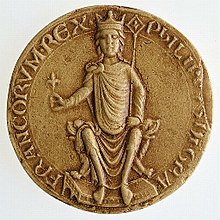Writing yesterday about St Louis prompted me to the thought that this year is the 800th anniversary of the death of his grandfather, Kng Philip II - Philip Augustus as he was termed by his monastic biographer Rigord - in 1223. Checking his actual anniversary I found that I have just missed it as he died on July 14th - an ominous date in French history.
He is one of the most significant Kings of France - indeed apparently the first to begin gradually to use that title from 1190 rather than King of the Franks, although that older version of the royal title remained in use in some aspects of government for many centuries to come.
Born in August 1165 to the third marriage of King Louis VII and being the long desired male heir to the throne he was seen as Dieudonneé and great celebrations ensued. He was crowned as Junior King in 1179 and the following year at the age of fifteen succeeded his father. His reign of just short of forty three years witnessed the transformation of the authority of the Capetians over their domain and kingdom. That is eloquently symbolised by the fact that he was the last French king to be crowned in his father’s lifetime to ensure a peaceful and secure transition from one monarch to another.
Wikipedia has a good account of his reign, his conflict with the Angevins and his matrimonial problems as well as indicating his many significant achievements and also his contributions to the development of Paris as a capital, and something about his personality at
Image: Wikipedia
A lot of this derives from the late Jim Bradbury’s eminently readable 1997 biography Philip Augustus King of France 1180-1225. This corrects some misapprehensions about him such as the claim that he lost the sight of one eye. Along with the contemporary description quoted by Wikipedia Bradbury suggests that we should envisage the King with a shock of fair hair in his earlier years, like his son Philip ‘Hurepel’.
As Bradbury indicates in his foreword King Philip tends to be viewed very much as an opponent in English historiography - how, in fact, given the conflict with the Angevins could it be otherwise - yet one can, and should, go on to view him impartially as one of the greatest French monarchs. His patience and adroitness, his ability to seize the initiative both in 1202-4 and a decade later at the battle of Bouvines, as well as his restraint in his later years had a great impact not just on the emergence and history of France but also of England.
The seal of King Philip II
Image: Wikipedia




No comments:
Post a Comment